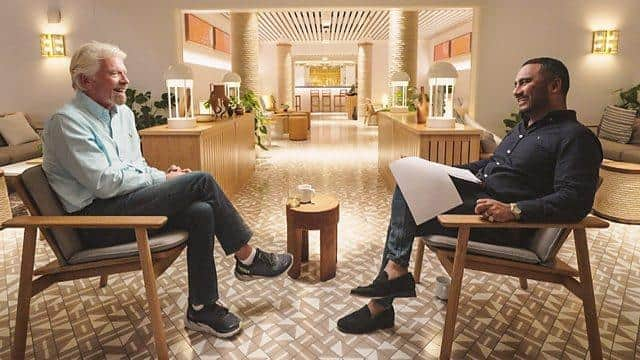Amol Rajan interviews Richard Branson
and live on Freeview channel 276
Every journalist whose job involves interviewing celebrities has a list of people they would love to chat to if their wildest dreams came true.
For many it’s the Hollywood A-list – Meryl Streep, Tom Cruise, Steven Spielberg. For others, it’s the movers and shakers in the political world, from Boris Johnson to Joe Biden.
Advertisement
Hide AdAdvertisement
Hide AdGiven the powerhouse episodes so far in this series, it would be interesting to know how many Amol Rajan has crossed off, after chewing the fat with Sundar Pichai, better known as the CEO of Google, eco-warrior Greta Thunberg and tech giant Bill Gates.
His latest subject is one of the biggest names in the business world: Richard Branson. Amol is renowned for not pulling his punches, but the entrepreneur is no shrinking violet either, so it should make for some compelling telly.
In some ways, Branson’s CV reads like a movie script. Alongside Nik Powell, he launched the magazine Student in 1966 at the tender age of 16, after trying to sell Christmas trees and budgerigars.
Although not a success, it did give Branson a vital advertising platform and would become a key part of his next venture, a mail-order record business that sought to undercut High Street brands.
Advertisement
Hide AdAdvertisement
Hide AdHe said about the move: “There is no point in starting your own business unless you do it out of a sense of frustration”.
After then opening a record shop in London’s Oxford Street, in 1972 Branson and Powell launched the Virgin Records label. Branson set up a recording studio north of Oxford, and leased time to newcomers such as Mike Oldfield. His Tubular Bells album was Virgin Records’ first release and a best-seller.
The label grew to become the world’s largest independent, with artists from The Sex Pistols to Culture Club sharing the stable.
In the 1980s, a cancelled flight to Puerto Rico led to the launch of Virgin Atlantic, though Branson had to sell the Virgin label to keep the airline in the black, followed by the launch of Virgin Rail Group.
Advertisement
Hide AdAdvertisement
Hide AdBy 1999, the empire expanded into the telecoms sector with Virgin Mobile, and in 2004 space tourism firm Virgin Galactic was born.


Branson wrote in his autobiography: “My interest in life comes from setting myself huge, apparently unachievable challenges and trying to rise above them”. He has certainly achieved that goal.
In the past 20 years, the serial entrepreneur’s Virgin brand has moved into the healthcare and financial spaces. He has invested in food, hyperloop technology, sustainable energy and drones.
That’s not to say he hasn’t seen his fair share of enterprises fail: Virgin Cola, Virgin Cars, Virgin Publishing, Virgin Clothing and Virgin Brides didn’t take off, but Branson remains philosophical.
Advertisement
Hide AdAdvertisement
Hide Ad“There’s nothing wrong with making mistakes as long as you don’t make the same ones over and over again,” he says.
No doubt his interview with Amol Rajan will touch on the business highs and lows, but it may also take in Branson’s adventures and brushes with death, his flirtations with politics and opposition to Brexit, as well as his establishment as a cultural icon.
Love him or loathe him, it seems there’s still much to find out about this charismatic man.